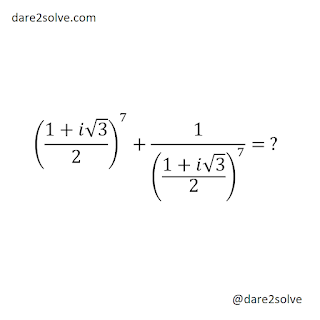This question was uploaded on 11/12/21 on social media accounts.
Solution 1:
Let,
\[x = \frac{1+i\sqrt3}2\]
\[\Rightarrow x^2 = \frac{1-i\sqrt3}2\]
\[\Rightarrow x^2 = x-1\]
Now,
\[x^7 = (x)(x^2)(x^2)(x^2)\]
\[\Rightarrow x^7 = (x)(x-1)(x-1)(x-1)\]
\[\Rightarrow x^7 = (x^2-x)(x^2-2x+1)\]
\[\Rightarrow x^7 = (x-1-x)(x-1-2x+1)\]
\[\Rightarrow x^7 = (-1)(-x) = x\]
Now, given equation:
\[\frac{1+i\sqrt3}2 + \frac1{\frac{1+i\sqrt3}2} = x + \frac1x = \frac{x^2+1}x = \frac xx = 1\]
Solution 2:
\[\frac{1+i\sqrt3}2 = \frac12+\frac{i\sqrt3}2 = \cos\left(\frac\pi3\right)+i\sin\left(\frac\pi3\right)\]
\[\Rightarrow \frac{1+i\sqrt3}2 = e^{i\pi/3}\]
Now, given equation:
\[\frac{1+i\sqrt3}2 + \frac1{\frac{1+i\sqrt3}2} = e^{i\pi/3} + e^{-i\pi/3} = 2\cos\left(\frac\pi3\right) = 1\]
Solution 3:
We know that:
\[\frac{1+i\sqrt3}2 = -ω\]
\[\Rightarrow \frac{1+i\sqrt3}2 + \frac1{\frac{1+i\sqrt3}2} = -ω^7-ω^{-7} = -(ω+ω^2) = 1\]







